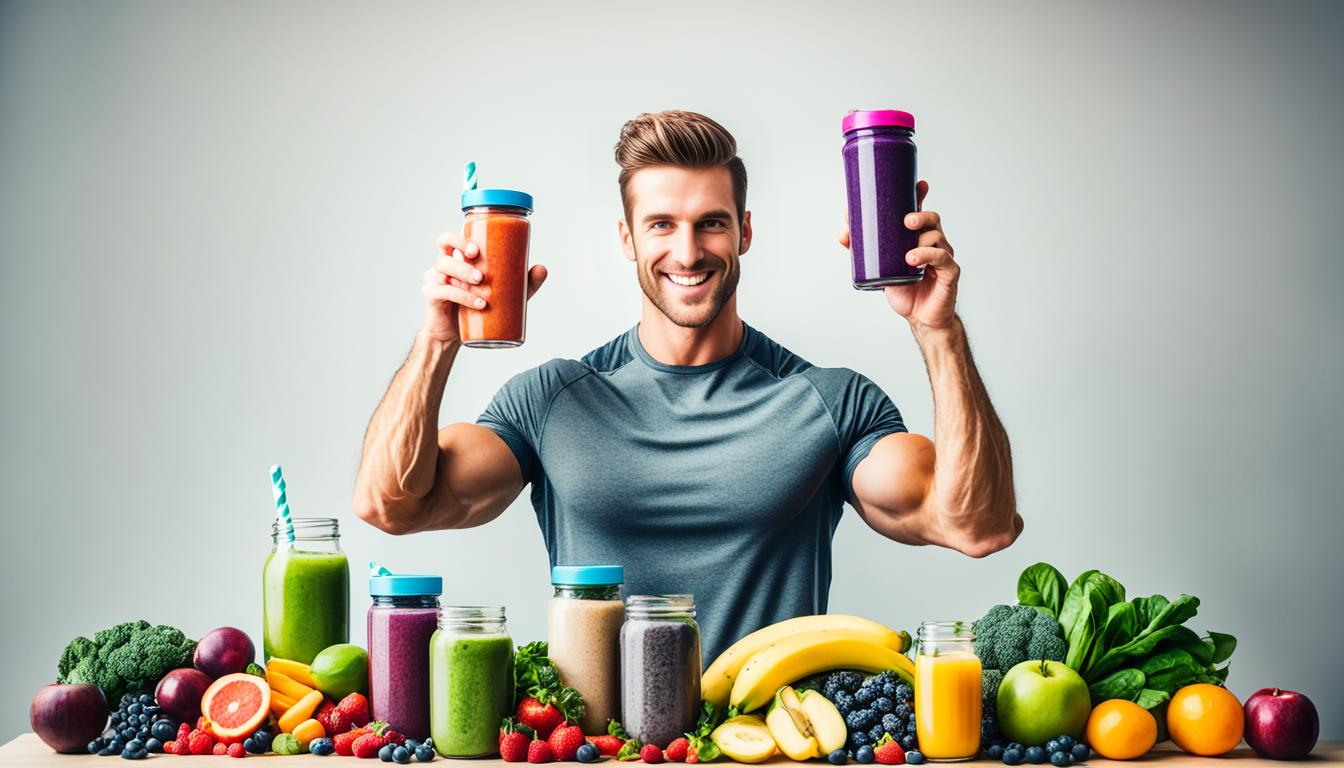Maximizing your workout performance hinges on the right pre-workout nutrition. It’s crucial to grasp the significance of hydration and meal timing for a boost in energy and results. By focusing on the correct macronutrients, you empower your body to excel and recover efficiently. This piece will explore key dietary elements vital for workout success, offering insights into fueling your fitness endeavors effectively.
Key Takeaways
- Pre-workout nutrition enhances workout performance through proper macronutrient intake.
- Hydration is crucial for maintaining energy levels during exercise.
- Meal timing can impact performance, with the ideal time being two hours before a workout.
- Carbohydrates are essential for increasing glycogen stores and boosting energy during exercise.
- Protein intake, specifically whey, supports muscle growth when consumed before workouts.
- Quick snacks, like fresh fruits, can offer immediate energy just before a workout.
Understanding the Importance of Pre-Workout Nutrition
Pre-workout nutrition is crucial for those aiming to boost performance and aid in recovery. For those dedicated to fitness, the right pre-workout nutrition boosts energy, elevates intensity, and minimizes muscle damage. By focusing on the benefits of pre-workout nutrition, individuals can expect better outcomes, tailored strategies, and an enhanced workout experience.
The timing and composition of your pre-workout meal are key. Large meals eaten 2-3 hours beforehand offer sufficient energy. Smaller meals or snacks taken 1-2 hours before help avoid feeling overly full. A small snack 30-60 minutes before exercise provides a timely energy lift. Proper nutrition for fitness enthusiasts ensures peak performance, whether you’re lifting or doing endurance activities.
The type of nutrients you consume also impacts your performance. Quick carbohydrates like fruits are ideal for strength training, while slow-digesting fats are better for endurance. Such strategic choices can significantly enhance your fitness journey, fully leveraging the benefits of pre-workout nutrition.
Role of Macronutrients in Pre-Workout Nutrition
Understanding the role of macronutrients in pre-workout nutrition can significantly enhance your workout performance. These three essential components—carbohydrates, protein, and healthy fats—provide the energy and support necessary for effective exercise. Balancing these macronutrients helps optimize your pre-workout snacks, ensuring you hit your fitness goals.
Carbohydrates: The Main Source of Energy
Carbohydrates serve as your body’s primary energy source, especially during high-intensity workouts. Consuming carbs before exercising replenishes glycogen stores, which are vital for maintaining energy levels. Aim to eat carbohydrates 1 to 4 hours prior to a workout for optimal performance. Suggested pre-workout snacks include yogurt, oatmeal, and fruits with nut butter, which provide readily available energy.
Protein: Supporting Muscle Performance
Protein plays a crucial role in supporting muscle performance and recovery. Including protein in your pre-workout nutrition enhances muscle repair and growth, making it an important macronutrient to focus on. Eating protein alongside carbohydrates before your workout can prepare your muscles for the strain of exercise and aid in their recovery following your session.
Fats: Sustained Energy for Endurance Activities
Healthy fats may not be the primary energy source during intense workouts, but they are essential for sustained energy, particularly in longer, lower-intensity activities. Including healthy fats in your pre-workout meal or snack can support endurance while ensuring the body has additional energy reserves to rely on. This balanced approach to macronutrients will keep you fueled and ready to perform at your best.
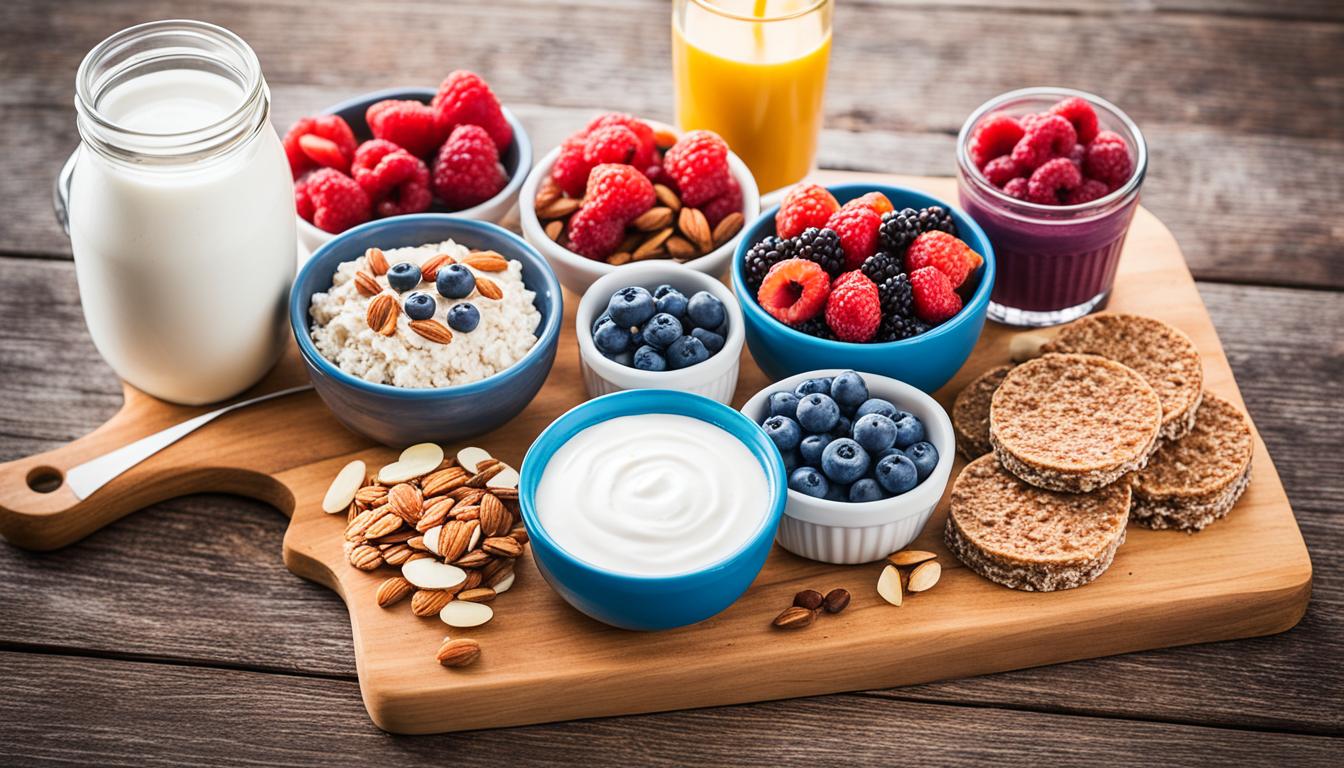
Best Pre-Workout Foods for Optimal Performance
Choosing the right pre-workout foods is crucial for boosting your workout effectiveness. Opt for foods that blend carbohydrates and protein, ensuring they are easy to digest. This approach helps to elevate your energy levels and prevents stomach discomfort during exercise. Excellent choices include whole-grain toast, oatmeal with fruit, and protein-packed smoothies. These foods offer immediate energy and support muscle function.
When planning your nutrition for athletes, tailor your pre-workout meal to the exercise type. For endurance activities, aim for a meal with 50 to 60% carbohydrates, along with proteins and healthy fats. For strength training, a mix of quick-digesting carbs and protein 30 to 60 minutes before exercise is ideal.
A well-thought-out pre-workout plan can significantly improve your performance. Consider the intensity of your workout and adjust your nutrition accordingly. Your pre-workout nutrition should focus on carbohydrates for energy, healthy fats for endurance, and proteins for muscle recovery. Knowing the best foods to eat will greatly impact your fitness results.
Pre-Workout Meal Ideas to Fuel Your Workout
Planning your pre-workout meals requires careful thought about timing. Choosing the right nutrition strategies is key to boosting your performance. Eating the correct foods at the right times before your workout gives you the energy needed to excel in your exercises.
Meals 2–3 Hours Before Exercise
For meals eaten 2 to 3 hours before exercise, focus on complex carbs and lean proteins. A turkey sandwich on whole-grain bread or a quinoa salad with vegetables provides sustained energy and vital amino acids. These meals are designed to replenish glycogen stores, offering energy that lasts throughout your workout. Adding healthy fats like olive oil or avocado dressing contributes to balanced nutrition without making you feel overly full. This method of meal planning supports muscle function and keeps blood sugar stable.
Snacks 30–60 Minutes Before Exercise
As your workout draws near, opt for snacks that are both light and potent. Greek yogurt with honey or a banana are excellent choices for quick, easy-to-digest carbs that won’t slow you down. These snacks can help elevate your blood sugar and energize your muscles at the right moment. The timing of your pre-workout snack is vital; eating something 30 to 60 minutes before your session can significantly improve your performance.
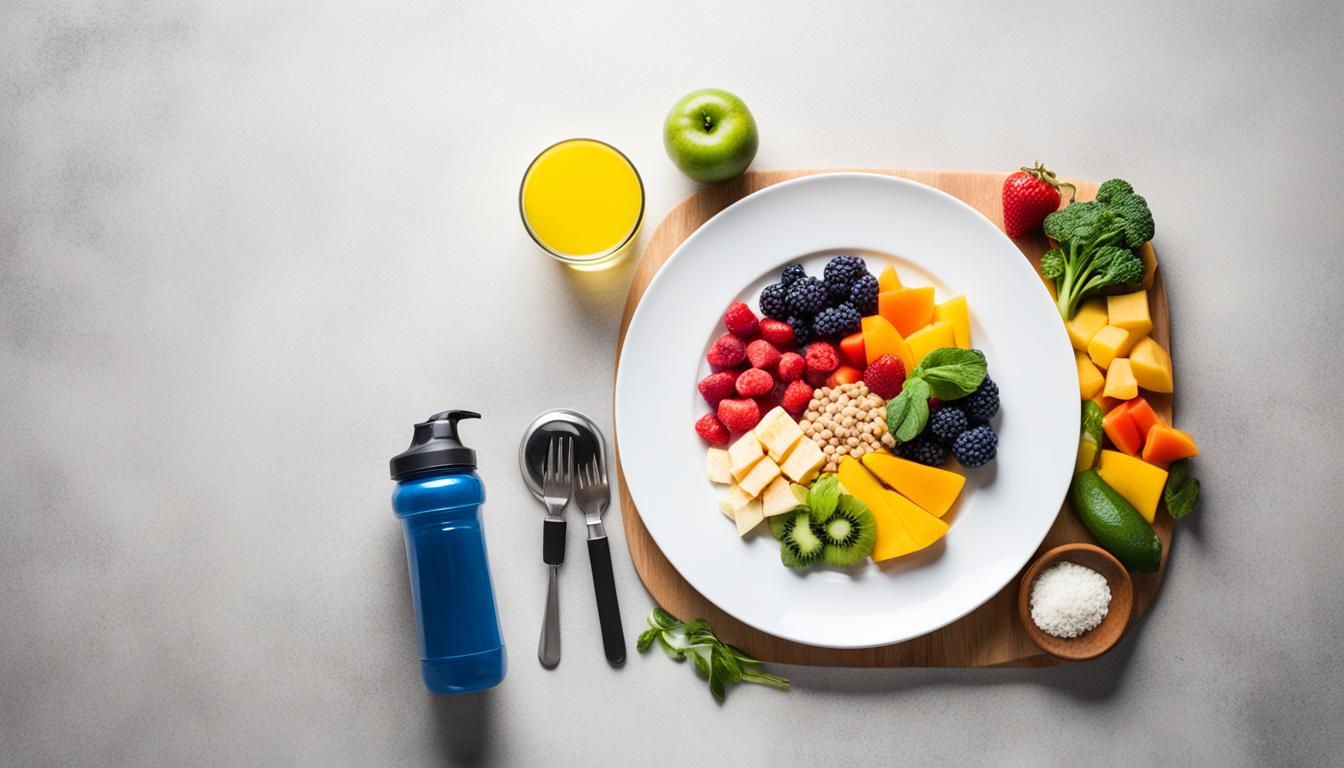
Timing of Pre-Workout Nutrition for Maximum Benefits
The timing of pre-workout nutrition is essential for boosting performance and achieving optimal results. A balanced meal, consumed 2–3 hours before exercise, aids in proper digestion and nutrient absorption. This is crucial for maintaining energy levels throughout your workout. For those with limited time, smaller snacks that digest quickly can be taken closer to exercise time.
Studies show that eating carbohydrates 15 minutes before endurance activities can improve your running capacity. Similarly, consuming carbohydrates an hour before cycling enhances performance. These studies highlight the importance of timing your intake to ensure nutrients are available during exercise, leading to better performance.
Training in a fasted state can improve glucose tolerance and enhance metabolism. Consider a nutrient-dense breakfast before exercising instead of fasting overnight. This approach raises post-exercise glucose levels. Post-exercise meals should focus on carbohydrates and proteins to aid in recovery and muscle repair.
A well-planned pre-workout nutrition routine helps meet energy needs, supports hormonal balance, and fuels your muscles effectively. For more tips on managing your fitness and meal timing, visit this resource.
Pre-Workout Snacks: Quick Energy Boosts
Choosing the right pre-workout snacks can greatly boost your energy during exercise. Opting for quick energy sources like fruits, nutrition bars, or yogurt can enhance your performance. These options provide easily digestible carbohydrates and essential nutrients for fueling your workout.
For those with limited time, snacks such as a banana with peanut butter or a granola bar are ideal. If you have more time, consider a peanut butter banana honey sandwich or a Greek yogurt parfait. It’s important to balance carbohydrates and protein in your snacks to maximize your workout potential.
Experts suggest adjusting your macronutrient intake based on your workout schedule. Consuming one gram of carbohydrates per kilogram of body weight one hour before, or two to three grams per kilogram two to three hours before exercise, can help maintain energy levels. Tailoring your snacks to your workout intensity and personal preferences can help you overcome physical challenges with ease.
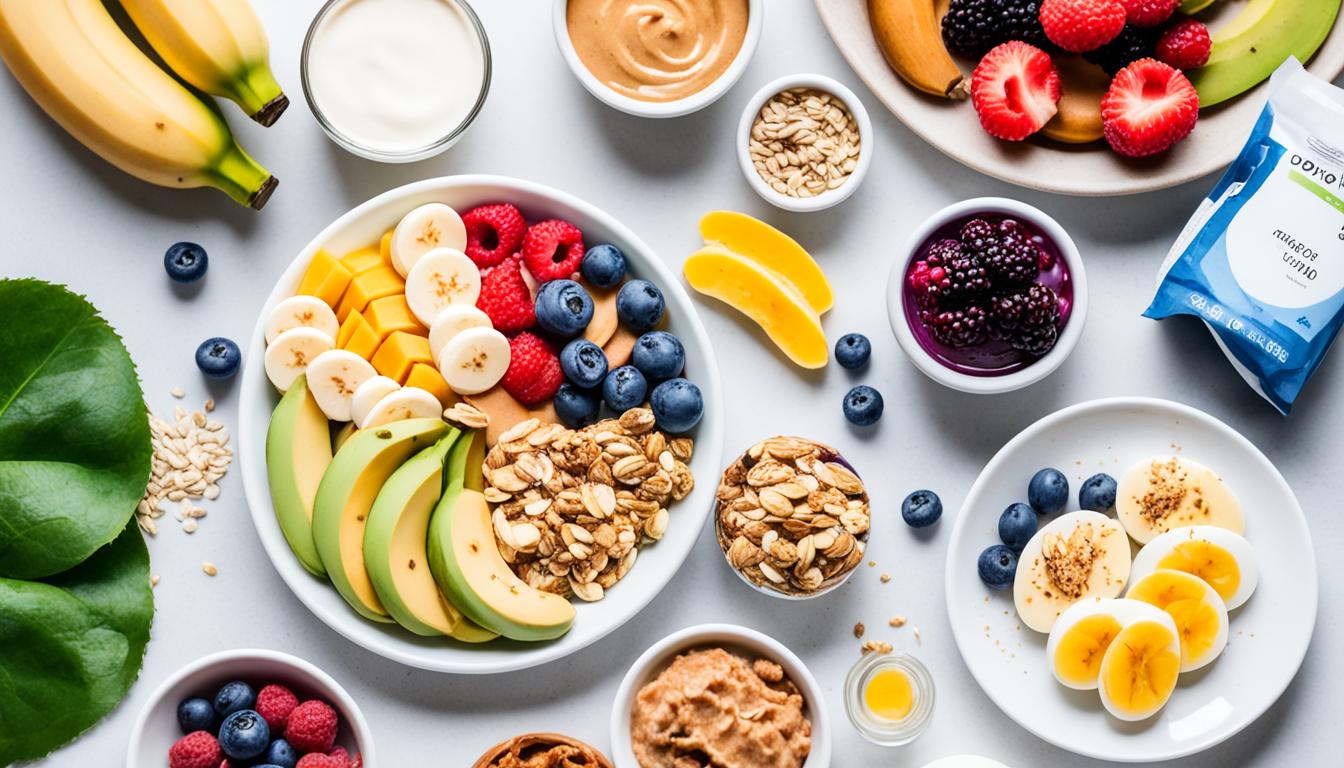
Hydration: The Key to Enhancing Performance
Staying well-hydrated is crucial for peak exercise performance. A well-thought-out hydration strategy helps your body perform optimally, especially in endurance sports. To prevent dehydration, drink water regularly throughout the day and focus on pre-workout hydration. This means you should consume enough fluids before beginning your workout.
How Much Water Should You Drink?
It’s advised to drink 16-20 ounces of water two to three hours before exercise. This initial hydration step is vital for a good start. During workouts over an hour, aim for 6 to 12 ounces of fluid every 20 minutes. Waiting to drink until you feel thirsty can lead to dehydration, affecting your performance. The ideal urine color for hydration is pale, straw yellow; darker colors mean you need more fluids.
Electrolyte Balance for Optimal Function
Electrolyte balance is key for peak performance, especially in long workouts. Intense exercise can lead to losing up to 3 quarts of fluid and vital minerals like salt. Sports drinks with carbohydrates and electrolytes are beneficial during these sessions. Aim for 200 milligrams of salt per 16-ounce serving to replenish lost electrolytes.
Isotonic beverages are useful when training under tough conditions to replace fluid and mineral loss. Proper hydration before, during, and after exercise enhances your fitness and performance.
Pre-Workout Nutrition Tips for Beginners
Embarking on your fitness journey can be both exhilarating and daunting, particularly when navigating nutrition. Adopting some pre-workout nutrition tips lays a crucial groundwork for enhancing your workouts. Begin with easy-to-digest carbs like bananas or oatmeal for a quick energy boost. Then, incorporate protein-rich foods, such as chicken or beans, to observe how your body adapts during physical activity.
Timing is paramount. Try eating your meals or snacks 2-3 hours prior to workouts to allow for proper digestion. This strategy reduces discomfort and elevates energy levels during your routine. As you advance, tweaking your meal timing may yield superior outcomes. A fundamental aspect of a beginner’s guide to nutrition is recognizing how varied foods affect your energy and stamina.
Hydration is non-negotiable. Consistent fluid intake boosts fitness performance and aids in recovery. Remember, balanced meals are vital, comprising proteins, carbs, and healthy fats. Opt for unsaturated fats from nuts and avocados to support health, while being cautious with saturated and trans fats.
As you delve deeper into your fitness journey, consider supplements like creatine and beta-alanine for enhanced training intensity and stamina. These supplements can aid in strength and muscle growth. Always heed your body’s signals and modify your regimen accordingly. For additional insights on overcoming fitness hurdles, consult this resource.
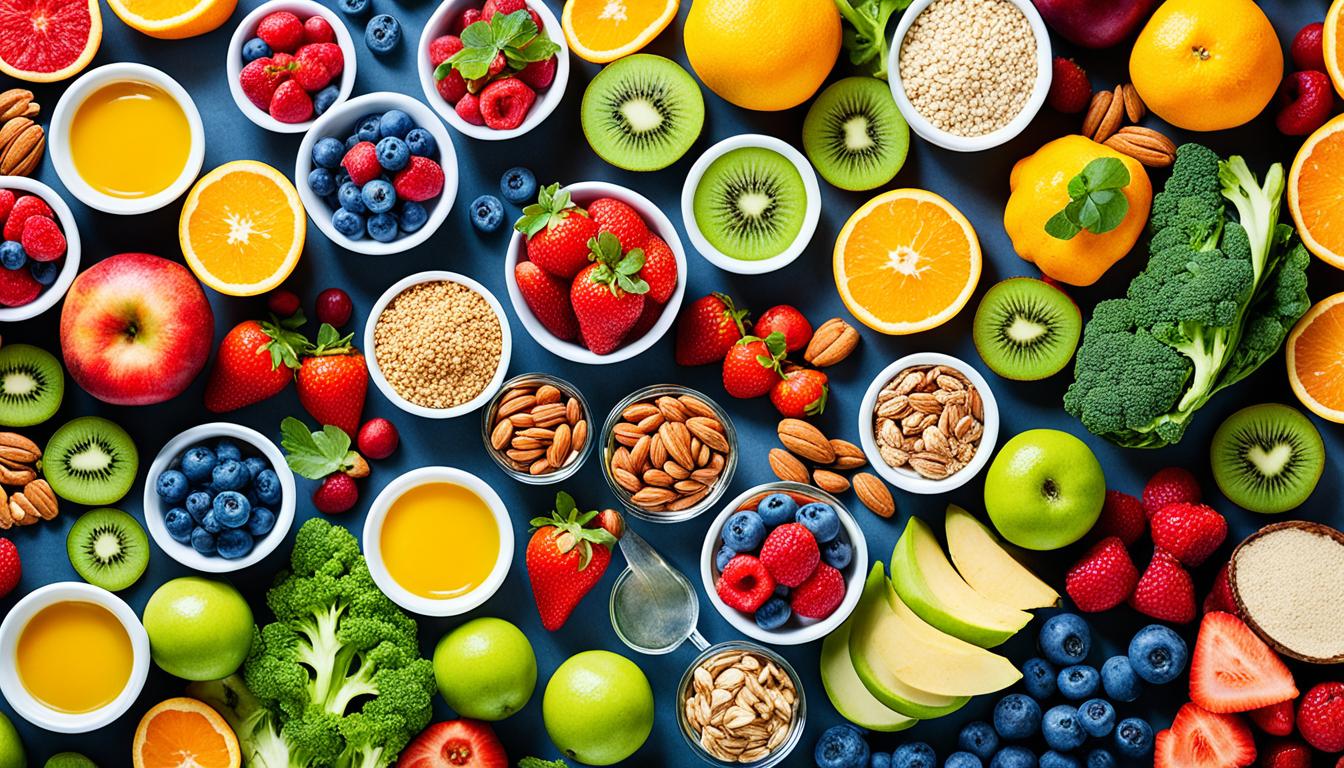
Pre-Workout Supplements: Are They Necessary?
Pre-workout supplements can significantly boost performance for those aiming at enhancing their fitness levels. It’s vital to grasp the types and timing of these supplements to fully leverage their benefits. Many individuals ponder whether these supplements are essential for reaching their workout objectives.
Popular Types of Supplements
Caffeine is a common component in pre-workout supplements, enhancing energy and focus. This boost can significantly improve exercise performance. Creatine, another widely used ingredient, aids in increasing muscle mass, strength, and exercise performance. Beta-alanine, an amino acid, prevents muscle acid buildup, enabling longer, more intense workouts. Branched-chain amino acids (BCAAs) are also popular, promoting muscle growth and reducing soreness post-exercise.
How and When to Take Supplements
Timing is crucial to maximize the benefits of pre-workout supplements. Consuming them 30-60 minutes before exercise ensures their effects are available when most needed. It’s crucial to be aware of how your body reacts to these supplements, given potential side effects. Mislabeling can occur, underscoring the need for choosing reputable brands. While supplements can aid in fitness goals, whole foods can also be a viable alternative, providing nutrients without the need for additives.
Benefits of Pre-Workout Nutrition on Performance
Understanding the benefits of pre-workout nutrition is crucial for anyone aiming to enhance their training. Nutrition fuels the body and directly affects energy levels, workout intensity, and overall performance. Adequate glycogen levels lead to notable performance improvements, preventing fatigue during exercises. Without proper nutrition, your body’s peak performance capability wanes, obstructing your fitness progress.
For nutrition for success, the right nutrient balance is key. Carbohydrates are the primary energy source, powering muscles during activity. Pre-workout consumption of 25-50 grams of carbs from fruits, vegetables, or whole grains boosts performance. Adding 10-20 grams of protein supports muscle growth and elevates energy, significantly impacting your training outcomes.
Hydration is equally vital for performance enhancement. Drinking 16-24 ounces of water 2-3 hours pre-workout ensures peak hydration, facilitating efficient body function. This hydration strategy aids in fatigue management, enabling longer, more intense workouts.
The synergistic impact of effective pre-workout nutrition sets a clear path to reaching fitness goals. It improves focus and mental clarity during exercise and aids in recovery post-workout. Prioritizing pre-workout meals is essential; they significantly influence your athletic experience and are a cornerstone of any fitness plan.
Conclusion
To truly fuel your fitness and enhance your workout performance, understanding pre-workout nutrition is crucial. Effective nutrition strategies that balance carbohydrates, proteins, and fats are essential. These strategies optimize your energy levels and maximize your results. Research consistently highlights the impact of timing and food choices on performance and recovery.
Remember, achieving fitness goals is not just about what you eat but when you eat it. Effective pre-workout nutrition can begin from 30 minutes to 4 hours before your exercise, based on digestion speed. Incorporate lean proteins, healthy fats, and quick-digesting carbohydrates into your pre-workout routine. This ensures you’re prepared for any challenge.
Ultimately, finding the perfect nutrition mix that suits your preferences will improve your performance. Adopt these guidelines and make informed choices. Prioritize pre-workout nutrition as a key part of your fitness journey.
FAQ
What is pre-workout nutrition and why is it important?
What are the best pre-workout foods?
When should I eat my pre-workout meal?
How can I ensure I’m properly hydrated before a workout?
What macronutrients should I focus on for pre-workout nutrition?
Are pre-workout supplements necessary for everyone?
What are some good pre-workout snacks I can try?
How does pre-workout nutrition affect my overall workout performance?
Source Links
- Pre-Workout Nutrition: What to Eat Before a Workout – https://www.healthline.com/nutrition/eat-before-workout
- Food as Fuel Before, During and After Workouts – https://www.heart.org/en/healthy-living/healthy-eating/eat-smart/nutrition-basics/food-as-fuel-before-during-and-after-workouts
- In Motion O.C. – https://www.inmotionoc.com/should-you-eat-before-working-out/
- Pre-Workout Nutrition – https://www.gocoppermine.com/pre-workout-nutrition/
- Health Benefits of Pre-Workout Supplements – https://www.webmd.com/fitness-exercise/health-benefits-pre-workout-supplements
- Mastering Pre-Workout and Post-Workout Nutrition: Macros for Strength, Performance, and Recovery | Blog | Camarata Chiropractic – https://www.camaratachiropractic.com/blog/mastering-pre-workout-and-post-workout-nutrition-macros-for-strength-performance-and-recovery
- Timing Your Pre- and Post-Workout Nutrition – https://www.eatright.org/fitness/physical-activity/exercise-nutrition/timing-your-pre-and-post-workout-nutrition
- Pre-Exercise Nutrition: The Role of Macronutrients, Modified Starches and Supplements on Metabolism and Endurance Performance – https://www.ncbi.nlm.nih.gov/pmc/articles/PMC4042570/
- Best Pre-Workout Food for a Successful Training Session | Garage Gym Reviews – https://www.garagegymreviews.com/best-pre-workout-food
- 6 Best Pre-workout Snacks and Food – https://www.resultspt.com/blog/posts/best-pre-workout-snacks-and-food
- The 6 Best Pre-Workout Snacks for More Energy – GoodRx – https://www.goodrx.com/well-being/diet-nutrition/best-pre-workout-snacks
- Tasty Pre- and Post-workout Meal Ideas (with Macro Counts!) – obé hub: Fitness education, at-home workouts, and more! – https://obefitness.com/blog/pre-and-post-workout-meal-ideas
- The Best Foods to Eat Before a Workout, According to Registered Dietitians – https://www.onepeloton.com/blog/what-to-eat-before-a-workout/
- Top 10 Pre-Workout Foods | Fuel Your Workout The Right Way – https://us.myprotein.com/thezone/nutrition/pre-workout-foods/
- What Should I Eat before Exercise? Pre-Exercise Nutrition and the Response to Endurance Exercise: Current Prospective and Future Directions – https://www.ncbi.nlm.nih.gov/pmc/articles/PMC7696145/
- Here’s What to Eat Before and After a Workout – https://www.hss.edu/article_eat-before-after-workout.asp
- The Best Pre-Workout Snacks for Men – https://www.menshealth.com/nutrition/a19542644/pre-workout-snacks/
- Best Pre-Workout Snack | Garage Gym Reviews – https://www.garagegymreviews.com/best-pre-workout-snack
- Sports and Hydration for Athletes: Q&A with a Dietitian – https://www.hopkinsmedicine.org/health/wellness-and-prevention/nutrition-and-fitness/sports-and-hydration-for-athletes
- Hydration to Maximize Performance and Recovery: Knowledge, Attitudes, and Behaviors Among Collegiate Track and Field Throwers – https://www.ncbi.nlm.nih.gov/pmc/articles/PMC8336541/
- Fueling and Hydrating Before, During and After Exercise – https://www.nationwidechildrens.org/specialties/sports-medicine/sports-medicine-articles/fueling-and-hydrating-before-during-and-after-exercise
- A Beginner’s Guide To Workout Nutrition: Before, During And After Training – https://www.bodybuilding.com/content/a-beginners-guide-to-workout-nutrition-before-during-and-after-training.html
- What to eat before a workout and when to eat it – https://www.medicalnewstoday.com/articles/322963
- Pre-Workout Supplements: Ingredients, Precautions, and More – https://www.healthline.com/nutrition/pre-workout-supplements
- What You Need to Know About Pre-Workout Supplements – https://www.texashealth.org/areyouawellbeing/Staying-Fit/What-You-Need-to-Know-About-Pre-Workout-Supplements
- The Importance of Pre and Post-Workout Nutrition | PFC | PFC – https://www.performancefoodcenters.com/blog/the-importance-of-pre-and-post-workout-nutrition
- What Happens to Your Body When You Take a Pre-Workout Supplement Every Day – https://www.eatingwell.com/article/8044310/pre-workout-supplements/
- Pre-Workout Nutrition: What to Eat to Fuel Performance and Build Muscle – https://outworknutrition.com/blogs/learn/pre-workout-nutrition-what-to-eat-to-fuel-performance-and-build-muscle
- The effect of acute pre-workout supplementation on power and strength performance – https://www.ncbi.nlm.nih.gov/pmc/articles/PMC4947244/
- Editorial: Pre-workout nutrition – https://www.ncbi.nlm.nih.gov/pmc/articles/PMC10402752/
- Gainful – https://www.gainful.com/blog/pre-workout-nutrition/

